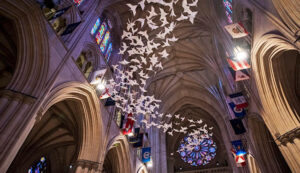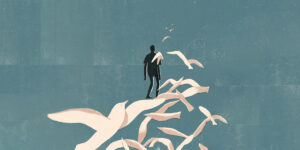‘…under her sky.’
Washington National Cathedral is hosting a new art exhibit showcasing thousands of paper doves suspended from the Cathedral’s vaulted, 100-foot-high ceiling through May 2021. The “Les Colombes” exhibit is by German artist Michael Pendry, who has created similar works at Cathedrals around the world, and symbolizes the Biblical theme of hope and optimism heading into the new year after a very challenging 2020.
Every moment and every event of every woman’s life on earth plants something in her soul. -Thomas Merton [changes to gender, mine.]
More from Merton:
Prayer is freedom and affirmation growing out of nothingness into love. It is the elevation of our limited freedom into the infinite freedom of the divine spirit and of the divine love. Prayer is an emergence into this area of infinite freedom.
~
Keep your eyes clean your ears quiet and your mind serene. Breathe Gaia’s air. Work, if you can, under her sky.
Dear Friends,
I’ve always called myself a lover of language and of the limits of language. But this week I take no pleasure in how tongue-tied I feel, standing before the disarray and fragility of our life together. It’s hard to put words out into the world right now for so many reasons. That they’re not big enough. That they never tell the whole truth. That we live in a moment so on edge and reactive that someone will take offense, or be wounded by my words, and that feels harder than ever before to risk and to bear.
There is an insanity to our life together right now that is directly related to the tenuous hold on sanity so many of us feel after surviving this past year.
That does not justify hatred or violence.
It does mean that we’re called to be as gentle with ourselves and others as we can possibly, reasonably muster. That sounds like such a modest contribution to the tumult all around and on our screens, but it is not.
I keep coming back in memory, and feeling in my body, to my experience of election night 2020. I observed it as someone who sees our political life together as a reflection of the human condition in all its complexity, contradiction, and mess. But I was also watching as a person who grew up in one of the “reddest” states, who now lives in one of the “bluest.” I felt a panicked sadness — this has remained my primary emotion through everything that has followed — as the cameras zoomed in and out on those maps of our country.
I saw visually what I know in life as it is lived: those maps marked up with definitive reds and blues don’t tell the truth of our alienation and its unsustainable intimacy. The fractures that actually define our nation right now do not run state to state or county to county, but neighborhood to neighborhood, family to family. They run through our dreams for our children on every side. They run through our hearts, and through our lives.
I am so grateful to have received, as I was struggling to write this, an email from Whitney Kimball Coe of the Rural Assembly and the Center for Rural Strategies. There is a whole epic story of our time in what is being gathered and created in the world she’s part of. It is in no way described or contained in a red-blue demographic lens of the “urban-rural divide.” She gave me permission to share this part of her email with you:
“I’m at home nursing my youngest, Susannah, who had a scary fall on Monday night and is now recuperating from surgery. She’s going to be fine, but my goodness, 2021 came in hard. Stream of consciousness moment:You know, our hospital experience put us directly in the path of so many wonderful East Tennesseans. Nurses and technicians and doctors, the other parents waiting in the ER, the parking attendant, the security guard. I’m sure many of them didn’t vote as I did in the last election and probably believe the events of Jan 6 were mere protests, but they responded to our trauma with their full humanity. I’d forgotten what it feels like to really see people beyond their tribe/ideology. It broke something open in me. I’ve been living in a castle of isolation these many months and it’s rotted and blotted my insides. I’m aware of contempt, anger, and maybe even paranoia coursing through my veins, and I wonder if that’s just a snippet of where we are as a nation.
Why is our righteous indignation and disgust so much easier to flame than our compassion?
It makes me realize that there is no substitute for coming into the presence of one another. No meme nor Twitter post nor op-ed nor breaking news nor TED talk can soften and strengthen our hearts like actually tending to one another. We don’t have to ignore/excuse the darkness we all carry, but we have to keep showing up so we don’t lose ourselves to bitterness.”
We cannot conjure up something so aspirational as “unity” by wishing it, and we are in fact impoverished when it comes to “common ground” between our societal trenches.
But if I’ve heard one thing most insistently, with an infinite variety of circumstance and struggle, from absolutely every beautiful and wise human I’ve ever met, it is this: We are creatures made, again and again, by what would break us. Yet only if we open to the fullness of the reality of what goes wrong for us, and walk ourselves with and through it, are we able to integrate it into a new kind of wholeness on the other side.
Our collective need for a new kind of wholeness might be the only aspiration we can share across all of our chasms right now.
Longings, too, can be common ground. A shared desire not to be lost to bitterness. A clear-eyed commitment that what divides us now does not have to define what can become possible between us. Questions, honestly asked, about how to make that real.
-Krista
[Krista Tippett is a Peabody Award-winning broadcaster, a National Humanities Medalist, a New York Times bestselling author, and founder of On Being.]


Leave a Reply